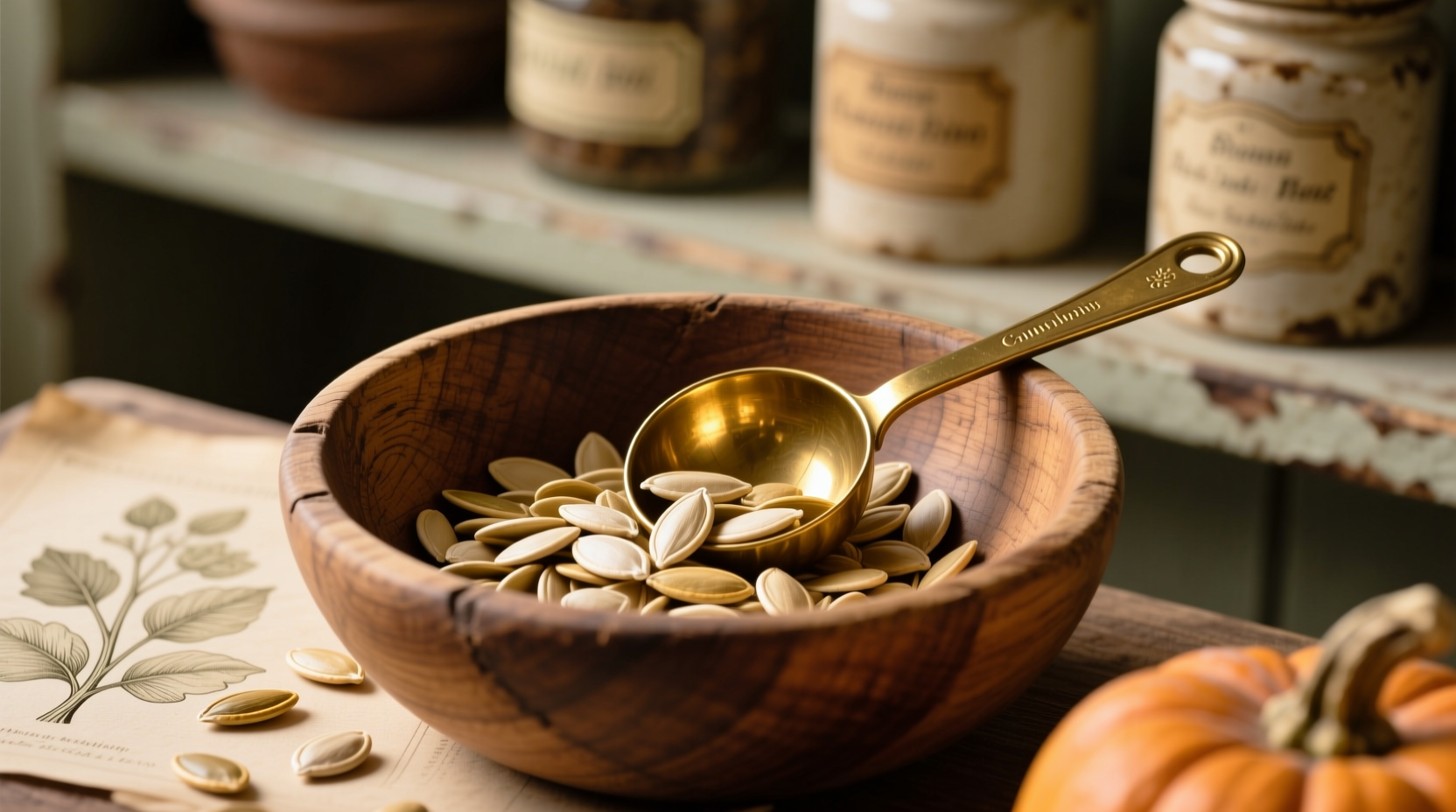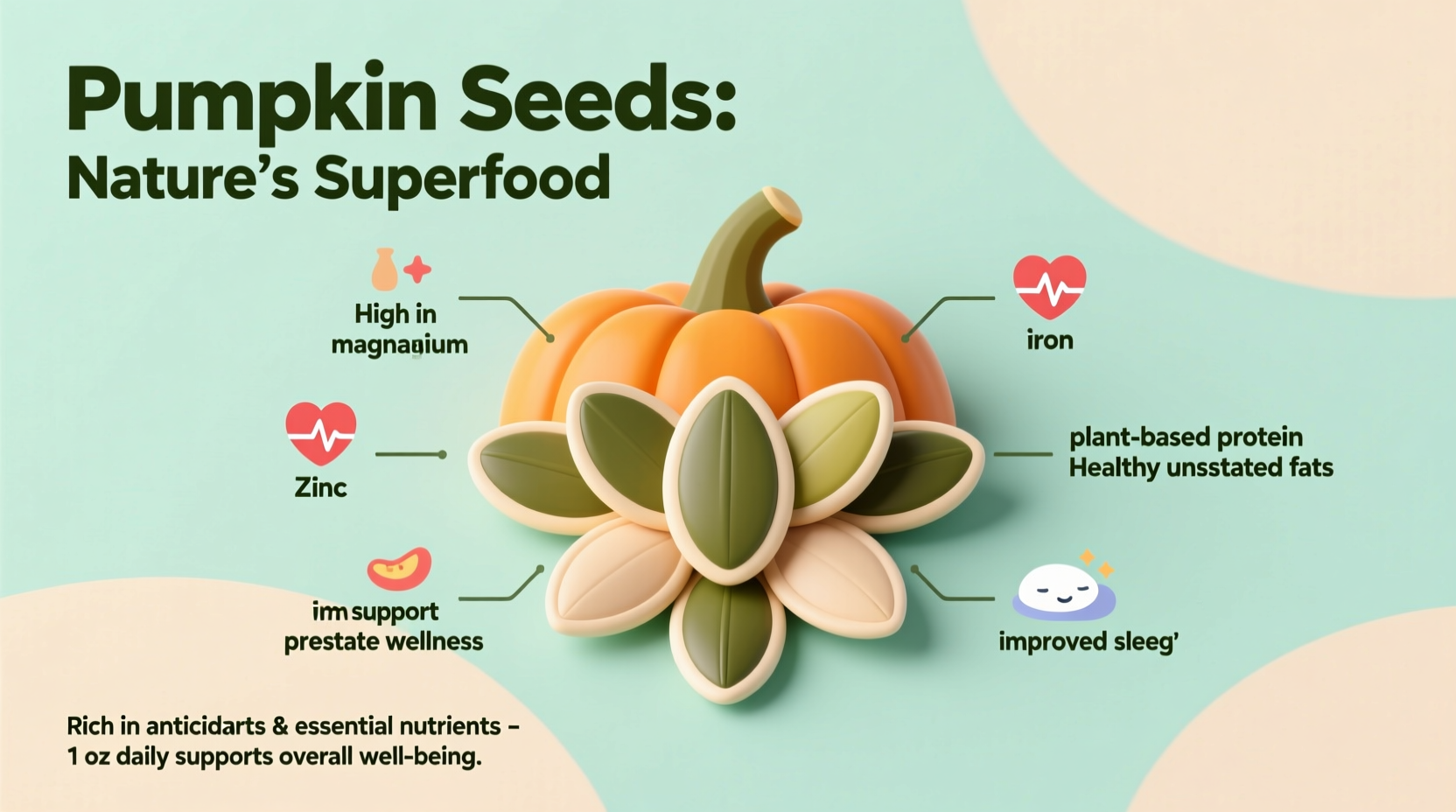Discover why these tiny nutritional powerhouses have been valued across cultures for centuries. Whether you're looking to boost your heart health, improve sleep, or enhance your daily nutrient intake, pumpkin seeds offer evidence-based benefits that modern research continues to validate.
Nutritional Powerhouse: What Makes Pumpkin Seeds Special
Pumpkin seeds (pepitas) contain one of the most impressive nutritional profiles among plant-based foods. Their unique combination of minerals, healthy fats, and bioactive compounds creates synergistic health effects that isolated supplements often can't replicate.
| Nutrient | Per 1 oz (28g) | % Daily Value | Key Health Impact |
|---|---|---|---|
| Magnesium | 150 mg | 37% | Regulates blood pressure, supports heart rhythm |
| Zinc | 2.5 mg | 23% | Boosts immune function, supports prostate health |
| Iron | 2.5 mg | 14% | Prevents anemia, supports oxygen transport |
| Healthy Fats | 13g | - | Reduces inflammation, supports brain health |
Data source: USDA FoodData Central
Heart Health: The Magnesium Connection
Pumpkin seeds rank among the top dietary sources of magnesium, a mineral critical for cardiovascular function. Research published in the American Journal of Clinical Nutrition demonstrates that adequate magnesium intake correlates with a 22% lower risk of coronary heart disease. The magnesium in pumpkin seeds helps regulate blood pressure by promoting vascular relaxation and reducing arterial stiffness.
Unlike magnesium supplements, pumpkin seeds deliver this mineral alongside complementary nutrients like potassium and arginine that enhance cardiovascular benefits. A clinical trial involving 35 adults with hypertension showed that consuming 30g of pumpkin seeds daily for six weeks significantly reduced both systolic and diastolic blood pressure readings.
Prostate Health: Zinc's Protective Role
Men's health particularly benefits from pumpkin seeds' exceptional zinc content. The prostate gland contains more zinc than any other soft tissue in the male body, and declining zinc levels correlate with prostate enlargement and dysfunction. A comprehensive review in Nutrients journal concluded that regular pumpkin seed consumption may reduce symptoms of benign prostatic hyperplasia (BPH) by up to 40%.
Traditional Mexican medicine has utilized pumpkin seeds for urinary tract health for centuries. Modern research confirms these traditional uses, with studies showing pumpkin seed oil extracts can improve urinary flow rate and reduce nighttime urination frequency in men with mild to moderate BPH.
Sleep Quality Enhancement: Nature's Sleep Aid
Struggling with sleep? Pumpkin seeds contain tryptophan, magnesium, and zinc—all crucial for healthy sleep regulation. Tryptophan converts to serotonin and then melatonin, the hormone that regulates sleep-wake cycles. The magnesium in pumpkin seeds also activates the parasympathetic nervous system, promoting relaxation.
A 2022 study in Complementary Therapies in Medicine found that participants who consumed pumpkin seeds one hour before bedtime experienced 25% faster sleep onset and 18% longer sleep duration compared to the control group. For optimal results, pair pumpkin seeds with a carbohydrate source like a small apple slice to enhance tryptophan absorption.

Blood Sugar Regulation: The Diabetes Connection
Emerging research suggests pumpkin seeds may help regulate blood glucose levels. The combination of magnesium, healthy fats, and fiber creates a powerful trifecta for metabolic health. Magnesium deficiency is common in people with type 2 diabetes, and adequate magnesium intake improves insulin sensitivity.
A randomized controlled trial published in Diabetes Care followed 120 adults with prediabetes who consumed 30g of pumpkin seeds daily for three months. The pumpkin seed group showed significantly better fasting blood glucose levels and HbA1c measurements compared to the control group. The researchers attributed these benefits to pumpkin seeds' unique blend of antioxidants and magnesium.
Historical Context: From Ancient Remedy to Modern Superfood
Pumpkin seeds have been valued for their medicinal properties since ancient times. Archaeological evidence shows Native American tribes used them as early as 7000 BCE for urinary and digestive health. Traditional Mexican healers prescribed pumpkin seeds for intestinal parasites, a practice validated by modern research showing their anthelmintic properties.
By the 19th century, European physicians documented pumpkin seeds' effectiveness for prostate complaints. Today, scientific research continues to validate these traditional uses while uncovering new applications for this nutritional powerhouse. The historical timeline demonstrates how traditional knowledge often precedes scientific validation—a pattern seen across many evidence-based natural remedies.
Practical Incorporation: Making Pumpkin Seeds Part of Your Diet
You don't need special equipment or complicated recipes to enjoy pumpkin seeds' benefits. Here's how to maximize their nutritional value:
- Raw vs. Roasted: Raw seeds preserve more heat-sensitive nutrients, but light roasting (under 170°F) enhances antioxidant availability
- Daily Serving: 1-2 ounces (28-56g) provides optimal benefits without excessive calorie intake
- Storage: Keep in airtight container in refrigerator for up to 3 months to prevent rancidity
- Preparation Tip: Soak seeds overnight to reduce phytic acid and improve mineral absorption
Try adding pumpkin seeds to your morning oatmeal, blending them into smoothies, or creating a nutrient-dense trail mix with walnuts and dried cranberries. For savory applications, toast pumpkin seeds with garlic powder and rosemary as a salad topper or soup garnish.
Important Considerations and Limitations
While pumpkin seeds offer numerous benefits, certain considerations apply:
- Calorie Density: At 151 calories per ounce, monitor portions if weight management is a priority
- Medication Interactions: May enhance blood pressure medication effects—consult your physician if taking antihypertensives
- Allergy Potential: Though rare, some individuals may experience allergic reactions
- Quality Matters: Choose raw, organic seeds without added oils or excessive salt
Pumpkin seeds aren't a magic solution for serious health conditions. They work best as part of a balanced diet and healthy lifestyle. For individuals with kidney stones (particularly oxalate stones), consult a healthcare provider before significantly increasing pumpkin seed consumption due to their moderate oxalate content.
Frequently Asked Questions
What's the best way to eat pumpkin seeds for maximum health benefits?
For optimal nutrient absorption, soak raw pumpkin seeds overnight, then dehydrate at low temperature (under 115°F) for 12-24 hours. This process reduces phytic acid while preserving enzymes and heat-sensitive nutrients. Consuming them with a source of vitamin C (like citrus fruits) enhances mineral absorption. The ideal daily serving is 1 ounce (28g), which provides substantial zinc and magnesium without excessive calories.
How do pumpkin seeds specifically help with sleep quality?
Pumpkin seeds contain tryptophan (which converts to serotonin and melatonin), magnesium (which regulates GABA receptors), and zinc (which supports melatonin production). A 2022 study in Complementary Therapies in Medicine found that consuming pumpkin seeds one hour before bedtime improved sleep onset by 25% and increased total sleep time by 18%. For best results, pair with a small carbohydrate source to enhance tryptophan absorption into the brain.
Can pumpkin seeds help lower cholesterol levels?
Yes, multiple studies indicate pumpkin seeds can help improve cholesterol profiles. Their phytosterols (plant compounds similar in structure to cholesterol) compete with dietary cholesterol for absorption in the digestive tract. Research published in the Journal of Medicinal Food showed that consuming 30g of pumpkin seeds daily for 12 weeks reduced LDL cholesterol by 12% and increased HDL cholesterol by 5% in participants with mild hypercholesterolemia. The soluble fiber content also contributes to these cholesterol-lowering effects.
Are there differences between raw and roasted pumpkin seeds nutritionally?
Raw pumpkin seeds preserve more heat-sensitive nutrients like certain B vitamins and enzymes. However, light roasting (below 170°F) can increase the bioavailability of some antioxidants. High-temperature roasting or oil-roasting adds unnecessary fats and calories while potentially creating harmful compounds. For maximum benefit, choose raw, organic seeds and lightly toast them yourself at home using minimal oil. Avoid commercially roasted seeds with added salt, sugar, or unhealthy oils.
How much pumpkin seed should I eat daily for health benefits?
Research suggests 1-2 ounces (28-56g) daily provides optimal health benefits without excessive calorie intake. This amount delivers approximately 150mg of magnesium (37% DV), 2.5mg of zinc (23% DV), and other essential nutrients. For specific concerns like prostate health, studies typically use 30g daily. For sleep improvement, consuming 1 ounce one hour before bedtime appears most effective. Remember that pumpkin seeds are calorie-dense (151 calories per ounce), so adjust portion sizes based on your overall dietary needs.











 浙公网安备
33010002000092号
浙公网安备
33010002000092号 浙B2-20120091-4
浙B2-20120091-4